English CBSE Class 12 NCERT Flamingo Poem 5 A Roadside Stand Free Solution of Extra Questions and Answers – Extract Based Questions Short Answer Questions Long Answer Questions and Value Based Questions
A ROADSIDE STAND
(Extra Questions)
Multiple Choice Questions
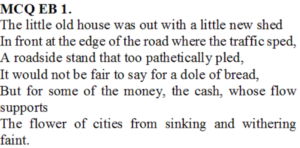

(i) Which of the following represents the purpose of making a roadside stand?
(a) For extension of existing house
(b) For getting something free of cost
(c) To reduce speed of traffic
(d) To earn some money
(ii) Based on the extract, please select the correct option –
Statement 1 – People living in that old house were in need of money
Statement 2 – People living in that house did not want mercy from others
(a) Statement 1 alone can be inferred from the extract
(b) Statement 2 can alone be inferred from the extract
(c) Neither Statement 1 nor Statement 2 can be inferred from the extract on
(d) Both Statement 1 and Statement 2 can be inferred from the extract
(iii) Which of the following have not been implied on the extract?
1. The shed is small
2. It is not far away from the road
3. Owner of shed wants to donate money
4. Money helps traverse routine of life
5. Bread is favourite food of people living in city
(a) 1 and 4
(b) 2 and 4
(c) 3 and 5
(d) 4 and 5
(iv) ‘The flower of cities from sinking and withering faint’. To what does the word ‘flower’ refer to in this line of the extract?
(a) Cinema Hall
(b) People
(c) Gardens
(d) Shopping Mall
(v) Which of the following word as used in the extract represents movement?
(a) shed
(b) pled
(c) faint
(d) sped
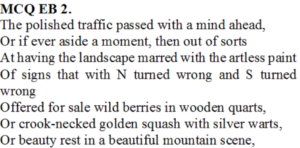

(i) Which of the following can be inferred from the extract?
Statement 1: Most people do not stop at the roadside stand
Statement 2: Owners of these sheds are not fully aware of alphabet.
(a) Statement 1 is true and Statement 2 cannot be inferred
(b) Statement 2 is true and Statement 1 cannot be inferred
(c) Statement 1 and Statement 2 both cannot be inferred
(d) Both statements can be inferred.
(ii) Which of the following phrase as used in the extract mean ‘upset’?
(a) out of sorts
(b) mind ahead
(c) marred with artless paint
(d) crook-necked
(iii) Which of the following is not being sold at the shed?
(a) berries
(b) squash
(c) scenery
(d) paint
(iv) Which of the following is incorrect use of ‘if ever’?
(a) If ever I get rich, I will buy a car.
(b) If ever I travel to USA, I will visit New York
(c) If ever I become a singer, I will perform at Royal Albert Hall
(d) If ever I breathe, I will inhale Oxygen
(v) Which of the following word is a colour as well as a metal?
(a) silver
(b) golden
(c) wooden
(d) crook
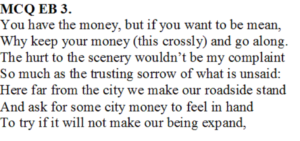

(i) Which of the following word has been used in the extract to mean ‘grow’?
(a) mean
(b) crossly
(c) trusting
(d) expand
(ii) Which of the following sentence correctly represents the feeling expressed in first two lines of the extract?
(a) We know you have money so you should have means to spend
(b) You may not have money but you should never be a mean
(c) We acknowledge that you take decision to spend your money
(d) We do not negotiate price to lure you to spend money.
(iii) According to the extract, which of the following emotion does not occur to the owners of roadside stand?
(a) hope
(b) complaint
(c) disappointment
(d) anger
(iv) At which of the following location the roadside stand has been made?
(a) outskirts of city
(b) within city
(c) close to city
(d) away from city
(v) Which of the following is not the motive of roadside stand owner?
(a) try to earn
(b) try to grow
(c) try to sell
(d) try to go along
(vi) Which of the following has the same poetic device as ‘trusting sorrow’?
(a) mighty dead
(b) deafening silence
(c) paper seeming boy
(d) honking horn
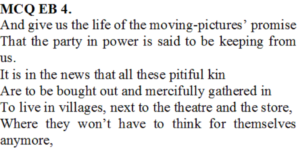

(i) Who, according to the extract, had made promise to the people?
(a) moving pictures
(b) politicians
(c) news bulletins
(d) theatres
(ii) Based on the following statements please choose the correct option.
Statement 1: People of villages also have their dreams.
Statement 2: People of villages are easily deceived.
(a) Statement 1 is the cause and Statement 2 is effect
(b) Both statements represent desirable effects
(c) Both statements represent valid causes
(d) Statement 2 is the cause and Statement 1 is effect
(iii) According to the extract which of the following is not promised to the villagers?
1. They will be shifted in city
2. Theaters would be near to them
3. Education centre would be near to them
4. Their life will be easy going
5. Shops will not be far from them
6. Other will be envious of them
(a) 1 and 5
(b) 2 and 3
(c) 3 and 4
(d) 3 and 6
(iv) A phrase ‘next to’ has been used in the extract. Which of the following is not the similar use of phrase ‘next to’?
(a) The Post Office is next to the theater
(b) David has been playing cricket in a ground next to his house
(c) My car is parked next to your car.
(d) I study physics next to chemistry
(v) Which of the following summarizes the theme expressed in the extract?
(a) All that glitters is not gold
(b) All cats are gray at night
(c) Action speaks louder than words
(d) Fortune favours the brave
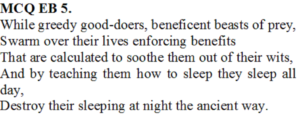

(i) Which of the following statement represents the end result expressed in the extract?
(a) In happiness you enjoy the music, in sorrow you understand the lyrics
(b) Give the gift of your absence to those who do not value your presence
(c) Life is an adventure but everyone is not a Columbus
(d) We deceive ourselves twice – first to their advantage and then to our disadvantage
(ii) Which of the following is used in the extract for the people who approach villagers
1. greedy
2. kind
3. empathetic
4. beasts
5. influencers
(a) 1,2,4
(b) 1,4,5
(c) 2,4,5
(d) 1,3,5
(iii) What is the impact on villagers of the discussion?
(a) happiness
(b) curiousity
(c) sympathy
(d) puzzled
(iv) The change in the sleeping pattern has been mentioned to indicate the change of
(a) life style
(b) opportunity
(c) attitude
(d) scope
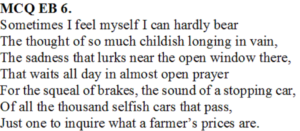

(i) What, according to the extract, the author finds unbearable?
(a) Selfishness of car owners
(b) The wail of a child
(c) The long wait of villagers
(d) The loud sound of brakes
(ii) Based on the following statements please choose the correct option.
Statement 1: They wish that some car would stop at their shop
Statement 2: Very small number of cars stop at their shop
(a) Statement 1 is the true and Statement 2 is false
(b) Both statements can be inferred from the extract
(c) Both statements are false
(d) Statement 2 is true and Statement 1 is false
(iii) According to the extract which of the following is not correct?
1. The author is disturbed at the plight of villagers
2. Villagers do not wait for the traffic to stop
3. Not many cars stop at the shop
4. While stopping, wheels of cars make a sound
5. Villagers are a happy lot
(a) 2 and 5
(b) 2 and 3
(c) 3 and 4
(d) 1 and 4
(iv) Which poetic device is used in the part ‘For the squeal of brakes’?
(a) Alliteration
(b) Metaphor
(c) Onomatopoeia
(d) Simile
(v) Which of the following is not the correct use of word ‘hardly’?
(a) I could hardly believe what I saw.
(b) We had hardly reached home that lights went off.
(c) Words can hardly describe beauty of this scene.
(d) Suresh is a brilliant student. He studies very hardly.
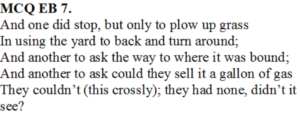

(i) What was the result when a car stopped and took a turn?
(a) It spoilt the mood
(b) It spoilt the grass
(c) It spoilt the colour
(d) It spoilt the journey
(ii) Based on the following statements please choose the correct option.
Statement 1: The car turns around the yard
Statement 2: The lawn of the yard is spoilt
(a) Statement 1 is the cause and Statement 2 is effect
(b) Both statements represent desirable effects
(c) Both statements represent valid causes
(d) Statement 2 is the cause and Statement 1 is effect
(iii) According to the extract which of the following makes shop owner angry?
(a) Turning around of the car
(b) When somebody enquires the way to their destination
(c) When somebody asks for a gallon of gas
(d) All the above
(iv) In the part of the sentence ‘And another to ask the way to where it was bound’ a word ‘bound’ has been used. Which of the following is the similar use of this word?
(a) Owing to your bad habits it was bound to happen.
(b) All the traffic was bound to the stadium.
(c) I am bound by my duties.
(d0 The doctor bound the wound with a new gauze.
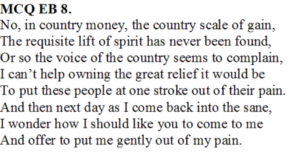

(i) Which of the following correctly represents the theme expressed by ‘The requisite lift of spirit has never been found’?
(a) The physical freedom has not been obtained
(b) The thought process has not improved
(c) The life style has not improved
(d) The emotional bond has not been understood
(ii) Based on the following statements please choose the correct option.
Statement 1: People of rural area speak about scarcity of money
Statement 2: The author has a doubt if others would help rural masses
(a) Statement 1 is true and Statement 2 is false
(b) Both statements represent desirable aspects
(c) Both statements are false
(d) Both statements can be inferred.
(iii) According to the extract which of the following are not implied?
1. Villagers have scarcity of money
2. Rural public complain about their poverty.
3. The author is nonchalant about plight of villagers
4. The author changes his first thought helping villagers
5. Villagers have no desire to improve their life style
(a) 1 and 5
(b) 2 and 3
(c) 3 and 4
(d) 3 and 5
(v) In which of the following the underlined words cannot be replaced by ‘’ at one stroke’?
(a) The doctor wanted to treat all the wounds
(b) When economy crashed, thousands lost their job simultaneously.
(c) My health will improve steadily.
(d) Many problems were solved instantly when my father gifted me a large money.
Extract based questions
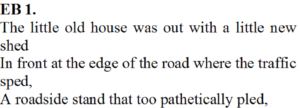

1. Identify the poem and the poet.
2. From where the traffic was coming?
3. Where was the ‘new shed’ constructed?
4. Which poetic device is used in ‘ The little old house was out with’?
5. Which word in the extract mean ‘requested’?
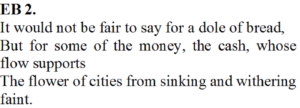

1. What is meant by ‘The flowers of cities’?
2. According to extract what support the life?
3. Why did villagers make a shed?
4. Which poetic device is used in ‘flowers of cities’?
5. Which word in the extract mean ‘unconscious?


1. Did vehicles want to stop at the shed?
2. Why did vehicle find that landscape is marred?
3. Which word in the extract mean ‘ugly’?
4. What was the focus in the mind of travelers?
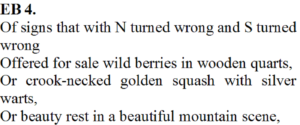

1. In your opinion why N and S were turned wrong?
2. Which poetic device has been used in ‘N turned wrong and S turned wrong’?
3. Of what material container of wild berries made of?
4. Which word in the extract is antonym of ‘purchase’?
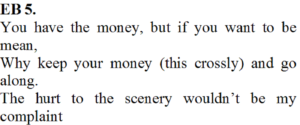

1. Why author feels that travelers could be mean?
2. When is the shopkeeper disappointed?
3. Does the shopkeeper express his complaint?
4. Which poetic device is used in ‘You have the money, but if you want to be’?
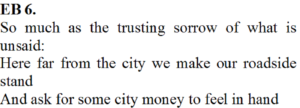

1. Is the roadside stand close to city?
2. Why the shed has been made?
3. Which poetic device has been used in ‘Here far from the city’?
4. Which word in the extract is synonym of ‘cash’?
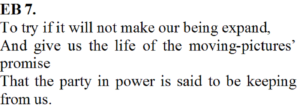

1. To whom does the word ‘us’ refer to?
2. What does the word ‘expand’ mean in above extract?
3. To whom does ‘the party in power’ refer to?
4. Which poetic device has been used in ‘the party in power is said’?
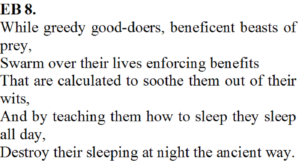

1. Why do ‘greedy good-doers’ help villagers?
2. Which poetic device is used in ‘how to sleep they sleep all day’?
3. Why their ancient way of sleep is destroyed?
4. What is the meaning ‘soothe them out of their wits’.
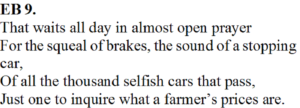

1. What is their prayer?
2. Why the cars are called selfish?
3. Among those who stop, what do most do?
4. Which poetic device is used in ‘the sound of selfish car’?
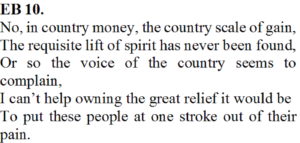

1. Do villagers earn enough money from sale of things?
2. What poetic device is used in ‘in country money, the country scale gain’?
3. How does the narrator want to provide relief?
4. Which word in the extract mean ‘thinking’?
Short Answer Questions – 30 to 40 words


Answer: The sound of brake of a vehicle means that the vehicle is going to stop. Thus it gives them a hope that some of their goods would be sold.
Hence they want to listen to ‘squeal of brakes’ .


Answer: Shrewd businessmen fool them and shift them to cities. They buy the rural land for their own benefit. Government is not giving due attention to them. The villagers continue to live in poverty.
Hence poet has sympathy towards them.


Answer: People travelling in vehicles are more concerned to reach their destination. Even when they look outside , the sheds are perceived as a spot on landscaping.
Thus they do not stop.


Answer: Villagers have made their shops along the road side. People travelling from city to another place are their likely customers.


Answer: It refers to those people who promise to do good for the villagers. But actually their motive is to earn profit for themselves and become more rich.
Hence the poet has used the term ‘greedy good-doers’.


Answer: Villagers think that many cars would stop in front of their shop to buy articles to help them earn money. But the reality is away from their wish. Hence it is called ‘childish longing’.
Having such a desire leads to disappointment among them.
Long Answer Questions – 120 to 150 words


New School Hostel,
08th April 20XX
Dear Mother,
Four months have passed since I started living in the hostel for taking higher education. During this period I have closely seen the city life and experienced the behaviour of city people.
In the morning everybody is running to get to his work place or to the school. Commuting time is very long. Stalls of unhealthy food, sweets and snacks are omnipresent. Air is polluted. Almost everybody is suffering from a disease. Long queues are common at every hospital and clinic. I go to a nearby garden every morning to get some fresh air.
No person in this city is bothered about other. Everybody is confined to oneself. There is lack of affection and consideration for others. Every behaviour is mechanical.
I would complete my education and return to our own village. I will start my business in the village to attract city dwellers.
Your lovely daughter,
YYY
****

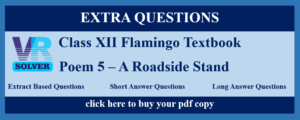

0 Comments